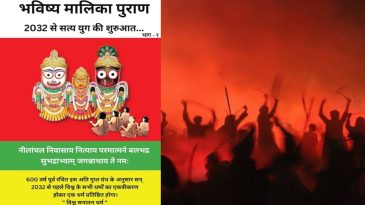- Astrology
- Updated on September 27, 2025
Bhavishya Malika Puran Predictions: Real, Fact or Fiction?
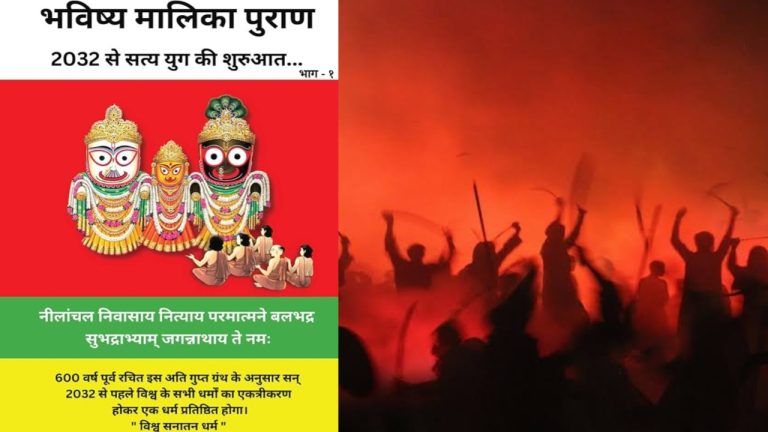
Bhavishya Malika Puran is an ancient Hindu riddle book filled with predictions of the world. Written in Sanskrit hundreds of years ago (500-1500 CE), it’s full of hidden messages that some people believe foretell what’s to come.
While many Hindus respect this text, it’s not a holy book. It’s more like a mysterious puzzle for those interested in prophecies and spiritual secrets.
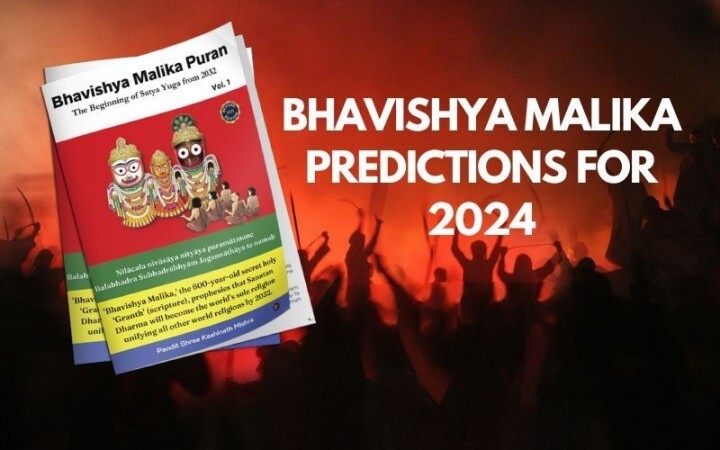
Bhavishya Malika: what does it say?
It is a complex and cryptic text, filled with prophecies and visions of the future. Since much of the content is open to interpretation, providing a concise answer about the text can be challenging.
Here is a brief overview of some recurring themes found in the Bhavishya Malika predictions:
1. Cycles of Time:
The concept of yugas, or ages, forms a fundamental basis for understanding the unfolding of events described in the text. Satya Yuga, Treta Yuga, Dvapara Yuga, and Kali Yuga began around 3102 BC and will last approximately 432,000 years. During Kali Yuga, humanity faces numerous challenges, suffering, strife, and degradation, culminating in the dissolution of the current age before transitioning into the next era.
a) Kaliyug ka Ant
Also known as the conclusion of Kali Yuga, this section portrays the final phase of the dark age marked by rampant deceit, greed, violence, and spiritual ignorance. It highlights severe hardships resulting from societal discord, environmental imbalance, and weak leadership, ultimately setting the stage for the epochal shift.
b) Mahavinash
Translating to ‘great annihilation,’ this part focuses on mass destruction triggered by natural disasters and catastrophic events. Consequences range from loss of lives and property to altered landscapes and ecosystems. Yet, amid despair, hope grows as survivors regroup and embark on healing journeys guided by visionaries advocating positive transformation.
c) Natural Disasters
The text mentions widespread destruction brought forth by earthquakes, storms, fires, droughts, epidemics, flooding, and other extreme weather phenomena. Often connected to moral decay, these catastrophes are warnings to reform spiritually.
2. Geopolitical Changes:
Political power struggles, warfare, conquests, migrations, and regime changes feature prominently throughout the narrative. Various nations and civilizations rise and fall, reflecting shifting balances of influence and control.
3. Aadya Satya Yug Ka Aagman:
The concluding segment celebrates the arrival of the pristine Satya Yuga or golden age. Characterized by harmony, wisdom, love, and peace, this auspicious beginning signals humanity’s triumph over adversity and descent into darkness. With virtue restored, beings flourish physically, mentally, and spiritually, illustrating the promise of renewal within every ending.
4. Spiritual Evolution
Enlightened masters, sages, and leaders guide humanity onto the path of righteousness, compassion, and unity. Renewed emphasis on meditation, selflessness, charity, education, and sustainable living helps create a better society during the twilight hours of Kali Yuga.
5. Transition to New Era
Eventually, after facing countless trials and tribulations, humanity enters the dawn of a new golden age – Satya Yuga. Peace, prosperity, happiness, wisdom, and enlightenment become ubiquitous features of life once again, signaling the completion of another cycle of existence.
What are the key predictions made in the text?
The Bhavishya Malika Puran says different religions will unite by 2032, creating a better future. It also warns of a big war and natural disasters before this happens. Here’s what the book predicts:
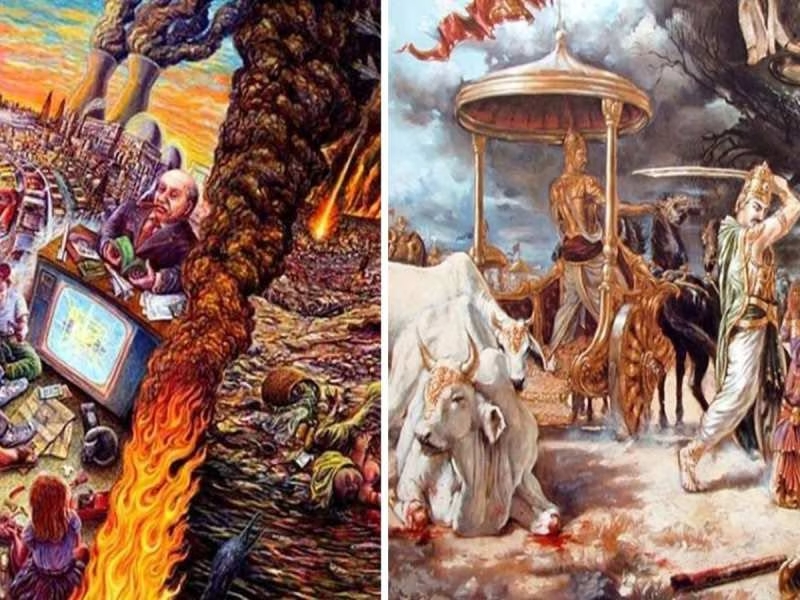
India’s Transformation
India’s journey of growth and change can be seen in many aspects of society.
1. Religious Unity
The Bhavishya Malika predicts a remarkable merging of various religions and beliefs into “Satya Sanatan Dharma” by 2032, paving the way for a more united and harmonious India.
2. Challenges and Devastation
However, before this golden age, the text warns of a turbulent period marked by a war with 13 Muslim Nations and China: A war involving India is predicted, potentially triggered by planetary alignments.
3. Natural Disasters
Strange things will happen in the sky with multiple suns. A comet or meteor will crash in the Bay of Bengal, causing huge waves in 6 coastal districts of Odisha.
Darkness: Earth is said to plunge into darkness for seven consecutive days between 2022 and 2029.
World’s Transformation
1. Global Conflict
The Bhavishya Malika doesn’t limit its predictions to India. World War III, lasting six and a half years impacted various regions.
2. Shifting Alliances
The text mentions potential conflicts between Russia and China, hinting at reshaping global power dynamics.
3. Renewal and Hope
Despite the challenges, the Bhavishya Malika ultimately suggests a positive outcome. After enduring these trials, humanity will enter a new era of peace and prosperity.
This book reminds us that bad things can happen, but there’s hope for the future. It encourages people to follow its teachings for a better world.
Significance of the Predictions
The significance of the predictions in the Bhavishya Malika Puran extends beyond mere fortune-telling. They serve as reminders of broader cosmic principles governing human existence. By highlighting cycles of creation and destruction, the text underscores essential themes of transience, adaptation, learning, and growth.
Accurate Predictions Till Date
There are a few recitations of Bhavishya Malika predictions that came true:
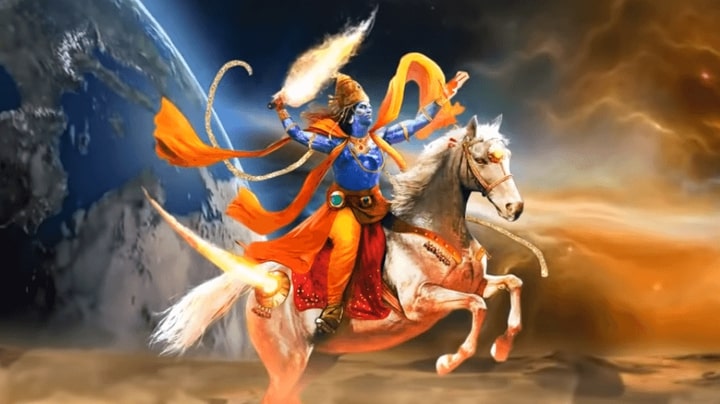
1. British Rule in India
Certain verses describing foreign invasion and domination have led some to associate them with the East India Company’s establishment of trading posts in Bengal during the early 17th century, eventually expanding into full-blown imperial rule until 1947.
2. Transportation Revolution
Phrases referring to vehicles moving at incredible speeds without animals pulling them are interpreted as prophecies coming true with the invention of cars, trains, and airplanes.
3. Global Conflict
Descriptions matching World Wars I and II, featuring massive bloodshed, economic instability, and ideological clashes, have fueled belief in the accuracy of some prophecies.
What Will Happen In 2024… According To Bhavishya Malika?
Unfortunately, the Bhavishya Malika Puran 2024 Predictions do not offer specific or concrete predictions for a precise year. Its focus lies primarily on cyclical patterns governing eras (yugas), emphasizing long-term trends rather than short-term forecasts.
What is the Bhavishya Malika Puran, and what are its core claims?
The Bhavishya Malika Puran is a Hindu text containing prophecies and visions of the future based on cosmic cycles. It describes the decline and eventual collapse of the existing order followed by renewal and rebirth. Core claims revolve around the concept of yugas, natural disasters, geopolitical changes, spiritual evolution, and transitions to new eras.
When and by whom was it written? Is it considered an authentic scripture?
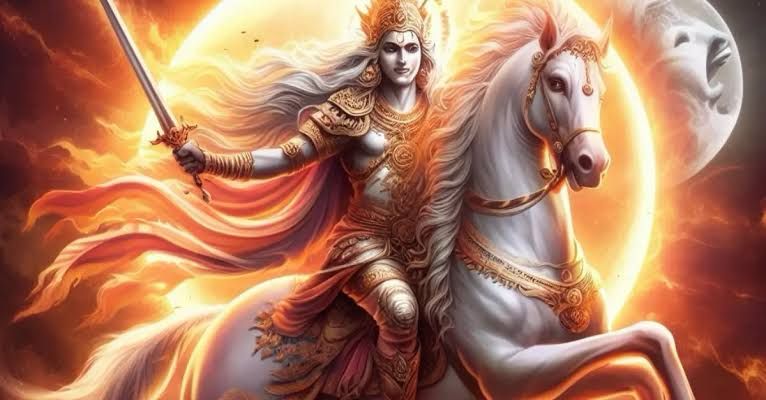
The exact authorship and dating of the Bhavishya Malika Puran remain uncertain, though estimates place it anywhere between 500-1500 CE. Due to its relatively late composition compared to other canonical Hindu texts, it doesn’t enjoy wide recognition as an authentic scripture. Opinions diverge sharply depending on regional traditions, sectarian affiliations, and scholarly perspectives.
Who Wrote the Book? What are the book details?
It is written by Achyutananad Das Ji, Kaliyuga Ka Ant around 500 years ago.
Comprising three main sections titled Kaliyug ka Ant (‘End of Kali Yuga’), Mahavinash (‘Great Destruction’), and Aadya Satya Yug Ka Aagaman (‘Arrival of Pristine Satya Yuga’), the Bhavishya Malika Puran explores various aspects of human civilization, divine intervention, cosmological processes, and spiritual evolution.
Where to Read or Purchase the Book?
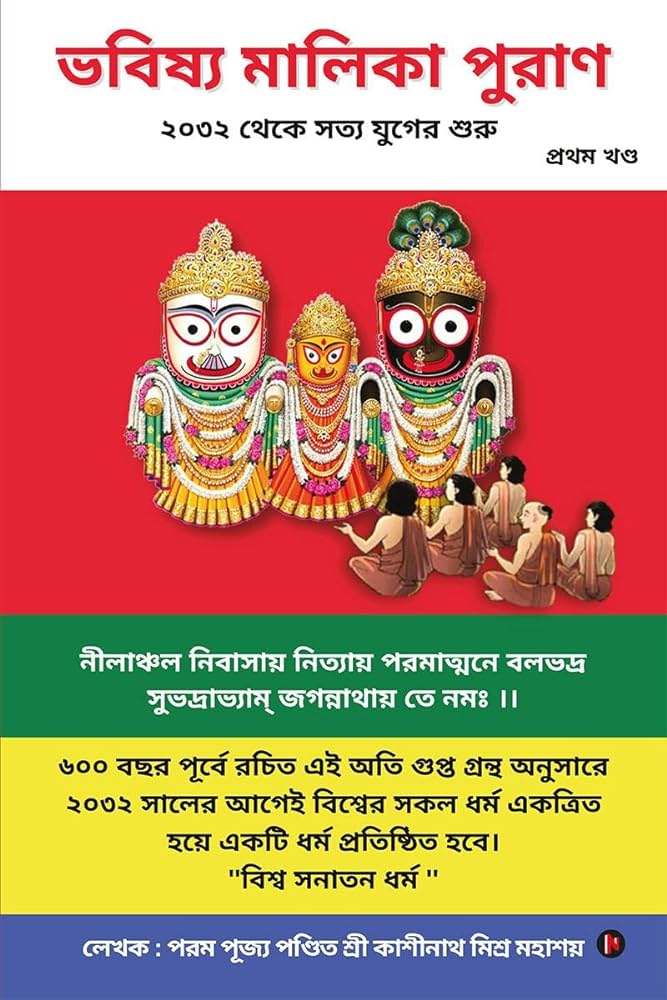
Physical and electronic versions of the Bhavishya Malika Puran are available at various online retailers, including Amazon and Barnes & Noble.
Reputable publishers specializing in Indic studies also carry print editions. Meanwhile, public and university libraries may hold relevant materials worth checking out.
Sacred-Texts.com, for example, offers free digital copies of Hindu texts. Remember to cross-verify information against reliable sources to ensure accurate comprehension.
Conclusion :
Evaluating the truthfulness of any prophecy, especially those presented in texts like the Bhavishya Malika Puran, can be subjective and depends on individual perspectives. Many factors come into play when assessing the validity of such predictions, including context, language, cultural nuances, and historical background. Additionally, since most prophetic texts use poetic license, symbolism, and allegory, extracting literal meanings becomes even more complicated.
Join the discussion
Related Articles
Trending Articles


- General
- Updated on February 20, 2026


- General
- Updated on February 18, 2026


- General
- Updated on February 17, 2026


- General
- Updated on February 10, 2026


- General
- Updated on February 14, 2026


- General
- Updated on February 7, 2026


- General
- Updated on February 5, 2026


- General
- Updated on February 2, 2026


- General
- Updated on January 29, 2026


- General
- Updated on January 24, 2026
No results available
Reset
